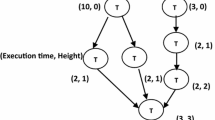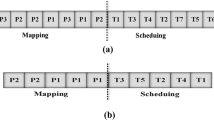Abstract
Scheduling in high-performance computing systems is experiencing potential challenges in modern computing applications due to different application sizes, computational requirements, resource utilization, rational completion time, etc. The scheduling problem is known to be an NP-complete problem. These challenges are moderated by the logical assignment of tasks to processors in a way to produce minimum schedule length and lesser load balance by utilizing system resources. In this paper, we proposed a novel genetic algorithm (GA)-based scheduling technique by considering four conflicting objectives, minimization of makespan, load balancing, and maximization of resource utilization, and speed up ratio. A novel mutation technique is proposed which helps to improve the considered multiple objectives. The performance of the proposed work is analyzed and validated through extensive simulation results using synthetic as well as benchmark data sets. It has been observed that the proposed work performs better than the existing algorithms, GA-based scheduling, priority-based performance-improved algorithm, and particle swarm optimization. A statistical hypothesis test ANOVA followed by post hoc analysis is conducted to demonstrate the significance of the work.







Similar content being viewed by others
References
Rodrigo GP, Östberg P-O, Elmroth E, Antypas K, Gerber R, Ramakrishnan L (2018) Towards understanding HPC users and systems: a NERSC case study. J Parallel Distrib Comput 111:206–221
Cunha RL, Rodrigues ER, Tizzei LP, Netto MA (2017) Job placement advisor based on turnaround predictions for hpc hybrid clouds. Future Gen Comput Syst 67:35–46
Jiang J, Lin Y, Xie G, Fu L, Yang J (2017) Time and energy optimization algorithms for the static scheduling of multiple workflows in heterogeneous computing system. J Grid Comput 15(4):435–456
Gogos C, Valouxis C, Alefragis P, Goulas G, Voros N, Housos E (2016) Scheduling independent tasks on heterogeneous processors using heuristics and column pricing. Future Gen Comput Syst 60:48–66
AlEbrahim S, Ahmad I (2017) Task scheduling for heterogeneous computing systems. J Supercomput 73(6):2313–2338
Biswas T, Kuila P, Ray AK (2017) Multi-level queue for task scheduling in heterogeneous distributed computing system. In: 4th international conference on advanced computing and communication systems (ICACCS). IEEE, pp 1–6
Sharma S, Kuila P (2015) Design of dependable task scheduling algorithm in cloud environment. In: Proceedings of the third international symposium on women in computing and informatics. ACM, pp 516–521
Xu Y, Li K, Hu J, Li K (2014) A genetic algorithm for task scheduling on heterogeneous computing systems using multiple priority queues. Inf Sci 270:255–287
Khandelwal M, Marto A, Fatemi SA, Ghoroqi M, Armaghani DJ, Singh T, Tabrizi O (2018) Implementing an ann model optimized by genetic algorithm for estimating cohesion of limestone samples. Eng Comput 34(2):307–317
Liu Y, Zhang C, Li B, Niu J (2017) DeMS: a hybrid scheme of task scheduling and load balancing in computing clusters. J Netw Comput Appl 83:213–220
Vasile M-A, Pop F, Tutueanu R-I, Cristea V, Kołodziej J (2015) Resource-aware hybrid scheduling algorithm in heterogeneous distributed computing. Future Gen Comput Syst 51:61–71
Panda SK, Jana PK (2016) Uncertainty-based QoS min–min algorithm for heterogeneous multi-cloud environment. Arab J Sci Eng 41(8):3003–3025
Jooyayeshendi A, Akkasi A (2015) Genetic algorithm for task scheduling in heterogeneous distributed computing system. Int J Sci Eng Res 6(7):1338–1345
Zhao C, Zhang S, Liu Q, Xie J, Hu J (2009) Independent tasks scheduling based on genetic algorithm in cloud computing. In: 5th international conference on wireless communications, networking and mobile computing, 2009. WiCom’09. IEEE, pp 1–4
Akbari M, Rashidi H, Alizadeh SH (2017) An enhanced genetic algorithm with new operators for task scheduling in heterogeneous computing systems. Eng Appl Artif Intell 61:35–46
Alkayal ES, Jennings NR, Abulkhair MF (2016) Efficient task scheduling multi-objective particle swarm optimization in cloud computing. In: 2016 IEEE 41st conference on local computer networks workshops (LCN workshops). IEEE, pp 17–24
Sheng X, Li Q (2016) Template-based genetic algorithm for QoS-aware task scheduling in cloud computing. In: 2016 international conference on advanced cloud and big data (CBD). IEEE, pp 25–30
Braun TD, Siegel HJ, Beck N, Bölöni LL, Maheswaran M, Reuther AI, Robertson JP, Theys MD, Yao B, Hensgen D et al (2001) A comparison of eleven static heuristics for mapping a class of independent tasks onto heterogeneous distributed computing systems. J Parallel Distrib Comput 61(6):810–837
Amalarethinam DG, Kavitha S (2017) Priority based performance improved algorithm for meta-task scheduling in cloud environment. Iin:, 2017 2nd international conference on computing and communications technologies (ICCCT), IEEE, pp 69–73
Maheswaran M, Braun TD, Siegel HJ (1999) Heterogeneous distributed computing. Encycl Electr Electron Eng 8:679–690
Ding S, Wu J, Xie G, Zeng G (2017) A hybrid heuristic-genetic algorithm with adaptive parameters for static task scheduling in heterogeneous computing system. In: Trustcom/BigDataSE/ICESS, 2017 IEEE. IEEE, pp 761–766
Pan S, Qiao J, Jiang J, Huang J, Zhang L (2017) Distributed resource scheduling algorithm based on hybrid genetic algorithm. In: 2017 international conference on computing intelligence and information system (CIIS). IEEE, pp 24–28
Liu Y, Zhao R, Zheng K, Wang S, Liu Y, Shen H, Zhou Q (2017) A hybrid parallel genetic algorithm with dynamic migration strategy based on sunway many-core processor. In: 2017 IEEE 19th international conference on high performance computing and communications workshops (HPCCWS). IEEE, pp 9–15
Jena R (2015) Multi objective task scheduling in cloud environment using nested pso framework. Procedia Comput Sci 57:1219–1227
Gupta R, Gajera V, Jana PK et al (2016) An effective multi-objective workflow scheduling in cloud computing: a PSO based approach. In: 2016 ninth international conference on contemporary computing (IC3). IEEE, pp 1–6
Biswas T, Kuila P, Ray AK (2018) A novel energy efficient scheduling for high performance computing systems. In: 9th international conference on computing, communication and networking technologies (9th ICCCNT). IEEE, pp 1–6
Kaur M, Kadam S (2018) A novel multi-objective bacteria foraging optimization algorithm (MOBFOA) for multi-objective scheduling. Appl Soft Comput 66:183–195
Zhang L, Li K, Li C, Li K (2017) Bi-objective workflow scheduling of the energy consumption and reliability in heterogeneous computing systems. Inf Sci 379:241–256
Xu Y, Li K, He L, Zhang L, Li K (2015) A hybrid chemical reaction optimization scheme for task scheduling on heterogeneous computing systems. IEEE Trans Parallel Distrib Syst 26(12):3208–3222
Liu J, Li K, Zhu D, Han J, Li K (2017) Minimizing cost of scheduling tasks on heterogeneous multicore embedded systems. ACM Trans Embed Comput Syst (TECS) 16(2):36
Papazachos ZC, Karatza HD (2015) Scheduling bags of tasks and gangs in a distributed system. In: 2015 international conference on computer, information and telecommunication systems (CITS). IEEE, pp 1–5
Konak A, Coit DW, Smith AE (2006) Multi-objective optimization using genetic algorithms: a tutorial. Reliab Eng Syst Saf 91(9):992–1007
Muller KE, Fetterman BA (2002) Regression and ANOVA: an integrated approach using SAS software. SAS Institute, Cary
Author information
Authors and Affiliations
Corresponding author
Additional information
Publisher's Note
Springer Nature remains neutral with regard to jurisdictional claims in published maps and institutional affiliations.
Rights and permissions
About this article
Cite this article
Biswas, T., Kuila, P. & Ray, A.K. A novel scheduling with multi-criteria for high-performance computing systems: an improved genetic algorithm-based approach. Engineering with Computers 35, 1475–1490 (2019). https://doi.org/10.1007/s00366-018-0676-5
Received:
Accepted:
Published:
Issue Date:
DOI: https://doi.org/10.1007/s00366-018-0676-5




